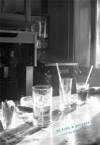Of Kids and Parents
Translated from Czechoslovakian by the noted curator, producer and journalist Marek Tomin, Emil Hakl’s Of Kids and Parents received a Magnesia Litera Book of the Year award in 2003 and has been made into a feature film. With the English version debuting this year from the Prague-based publisher Twisted Spoon Press, this engrossing book is worth checking out.
Translated from Czechoslovakian by the noted curator, producer and journalist Marek Tomin, Emil Hakl’s Of Kids and Parents received a Magnesia Litera Book of the Year award in 2003 and has been made into a feature film. With the English version debuting this year from the Prague-based publisher Twisted Spoon Press, this engrossing book is worth checking out.
Hakl’s book itself is a walking tour of Prague, the story not so much one single cohesive story or narration so much as a conglomeration of stories shared between father and son as they walk familiar roads and visit random visit bars to reminisce on the past and ponder the present. Hakl immediately immerses the reader in a steady stream of dialogue that continues throughout most of the book, a format that has garnered comparisons with Joyce’s Ulysses. Touching on topics of war and politics, love, poverty, travel and nearly everything in between, the book’s true theme has to do with the nature of existence, the world and humanity’s place in it. But it’s not presented as anything as lofty as that.
This 71-year-old father and his 42-year-old son have a relationship that many people can relate to. Sometimes they don’t like each other, sometimes they quibble, and sometimes they laugh. The son, Honza, harbors a decades-old irritation with his father that often leads him to sulk rather than communicate, but it’s all part of their story.
The stories they tell are the novel’s real draw. Tales of war and survival during Hitler’s regime lead Honza to conclusions like, “We are forever enclosed in a grey, impenetrable sphere of smoke, excrement and laughter. People, the earth, the universe and us, the kids.” The 20th century European experience, while vastly different from the American one, is still similar on some levels. Hakl delineates a commonality of experience that links everyone on earth in the sense that we are kids to a certain extent; we all have parents, whether we relate to them or not; we’re still kids, even if we’re grown, since, to a point, we’re products of the cultural and political environment that surrounds us. But again, the message comes through not in any lofty terms, but simply in the stories and tales exchanged between a father and his son.
At one point, Honza asks his father, “So what’s new?” to which he receives the reply, “Nothing’s been new in this world for more than two billion years, it’s all just variations on the same theme of carbon, hydrogen, helium and nitrogen.”
At another point, the book turns to metacommentary, as Honza’s father shares a story about a woman he met, quipping, “It’s a bit sad in terms of reality, but it would make a fine short story.” To which Honza replies, “Except there’s no climax whatsoever.”
“As with everything that actually happens! You only get a climax in films and stupid books…”
While a good part of their conversation should be taken with a grain of salt, Of Kids and Parents is one of those unique books that does not really contain a climax, nor does it need one. That’s not its purpose. If it is true, as Honza’s father muses, that “beginnings never tell you anything about endings,” then perhaps Of Kids and Parents is just a sampling of what happens in the middle of things, offering the sheer entertainment value of its stories in place of any more definitive statement.





